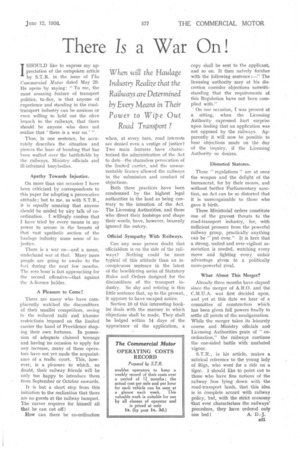There Is a War On!
Page 49

If you've noticed an error in this article please click here to report it so we can fix it.
When will the Haulage Industry Realize that the Railways are Determined by Every Means in Their Power to Wipe Out Road Transport? IsHouLo like to express my appreciation of the outspoken article by S.T.R. in the issue of The Commercial Motor dated May 29. He opens by saying: "To me, the most amazing feature of transport politics, to-day, is that anyone of experience and standing in the roadtransport industry can be anxious or even willing to hold out the olive branch to the railways, that there should . be anyone who does not realize that ' there is a war on.' "
Thus, in one sentence, he accurately describes the situation and pierces the haze of humbug that has been wafted over the battlefields by the railways, Ministry officials and ill-informed busybodies.
Apathy Towards Injustice.
On more than one occasion I have been criticized by correspondents to this paper for adopting a provocative attitude ; but to me, as with S.T.R., it is equally amazing that anyone should be misled by airy talk of coordination. I willingly confess that I have tried by every means in my power to arouse in the breasts of that vast apathetic section of the haulage industry some sense of injustice.
There is a war on—and a mean, underhand war at that. Many more people are going to awake to the fact during the next few months.• The zero hour is fast approaching for the second offensive—that against the A-licence holder.
A Pleasure to Come!
There are many who have complacently watched the discomfiture of their smaller competitors, seeing in the reduced radii and irksome restrictioris imposed on the limited carrier the hand of Providence shaping their own fortunes. In possession of adequate claimed tonnage and having no occasion to apply for any increase, many of these operators have not yet made the acquaintance of a traffic court. This, however, is a pleasure to which, no doubt, their railway friends will be only too happy to introduce them from September or October onwards.
It is but a short., step from this initiation to the realization that there are no guests at the railway banquet. The carver requires for himself all that he can cut off! • How can there be co-ordination when, at every turn, road interests are denied even a vestige of justice'? Two main features have characterized the administration of the Act to date—the shameless persecution of the limited carrier, and the unwarrantable licence allowed the railways in the submission and conduct of objections.
Both these practices have been condemned by the highest legal authorities in the land as being contrary to the intention of the Act. The Licensing Authorities, and those who direct their footsteps and shape their words, have, however, brazenly ignored the outcry.
Official Sympathy With Railways.
Can any sane person doubt that officialdom is on the side of the railways? Nothing could be more typical of this attitude than an inconspicuous sentence in the latest of the bewildering series of Statutory Rules and Orders designed for the discomfiture of the transport industry. So shy and retiring is this little sentence that, up to the present, it appears to have escaped notice.
Section 10 of this interesting booklet deals with the manner in which objections shall be made. They shall be lodged within 14 days of the appearance of the application, a copy shall be sent to the applicant, and so on. It then naïvely finishes with the following sentence :—" The licensing authority may at his discretion consider objections notwithstanding that the requirements of this Regulation have not been complied with."
' On one occasion, I was present at a sitting, when the Licensing Authority expressed hurt surprise upon finding that an application was not opposed by the railways. Apparently it will now be possible to hear objections made on the day of the inquiry, if the Licensing Authority so desires.
Distorted Statutes.
These " regulations " are at once the weapon and the delight of the bureaucrat, for by their means, and without further Parliamentary sanction, an Act can be so distorted that it is unrecognizable to those who gave it birth.
These Ministerial orders constitute one of the gravest threats to the road-transport industry, for, with sufficient pressure from the powerful railway group, practically anything can be " put over." It is here that a strong, united and ever-vigilant association is needed, watching every move and fighting every unfair advantage given to a politically more-powerful rival.
What About This Merger?
Already three months have elapsed since the merger of A.R.O. and the C.M.U.A. was first decided upon, and yet at this date we hear of a committee of construction which has been given full powers finally to settle all points of the amalgamation. While the merger takes its leisurely course and Ministry officials and Licensing Authorities prate of "coordination," the railways continue the one-sided battle with unabated vigour.
S.T.R., in his article, makes a satirical reference to the young lady of Riga, who went for a ride on a tiger. I should like to point out to those who have fine notions of the railway lion lying down with the road-transport lamb, that this idea is in complete accord with railway policy, but, with the strict economy that ever characterizes the railways' procedure, they have ordered only one bed 1 A. D.-J.




































































































